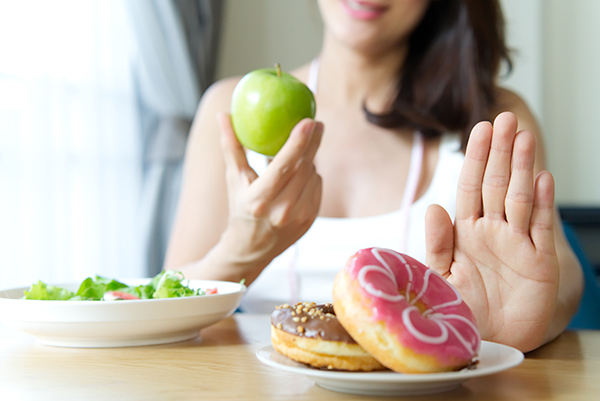
Advertisement
Dessert is often a staple of all meals for most people, but have you ever wondered why you crave something sweet after you’ve eaten, even if you’re already full? According to health experts, the issue may be something more than just a sweet tooth.
Understanding your preference for sweet foods
Dr. Jen Nash, a clinical psychologist who specializes in eating behavior, and nutritionist Fiona Hunter explain that there’s more to sweet cravings than an urge to eat junk food. And if you’re worried about your sugar consumption, there are natural ways to get your cravings under control.
According to Hunter, humans were “all born with a preference for sweet foods.” This is because most bitter and sour foods are more likely to be poisonous. Your love for sweet things is actually an evolutionary process designed to guide you to foods that are safe and nutritious.
Nash says that humans also have an evolutionary drive to crave high-energy food like sugar, which gave people energy essential for survival, especially when food was scarce.
Human brains are programmed to enjoy food since it fuels the body. However, with the help of neuroimaging studies, modern humans are now more aware of what happens in the brain when they consume too much sugar.

Your childhood may influence your sweet cravings
Think back on those days when you’ve been feeling down in the dumps. Didn’t you feel just a little bit better after you’ve enjoyed some ice cream or a piece of candy?
Nash explains that based on brain scans, sugar intake leads to dopamine being released in the brain area that is associated with motivation, novelty and reward. This suggests that there is a scientific explanation for why your mood improves after enjoying a sweet treat.
Specific cravings can also be influenced by your childhood, added Hunter. Your cravings are usually influenced by what kinds of food you were given as a child as a reward or treat, or to make you feel better if you were crying or throwing a tantrum.
If your parents often gave you cookies or chocolates as a reward when you were younger, you might crave the same snacks as an adult since you learn to associate these kinds of foods with “feelings of happiness.”
The first taste you experience as an infant (i.e., breastmilk) is sweet. Sweet tastes are usually associated with being calmed and soothed. While this seems touching, it can be problematic if you consume too much junk food and sugary treats.
Why do you get sweet cravings after every meal?
Nash explains that you may experience sweet cravings because of reasons like taste, habits and emotional needs.
Taste and primal needs
Eating is driven by primal needs and your taste buds can distinguish five different tastes: sweet, sour, salty, spicy (pungent) and bitter.
Having all five tastes in one meal makes you more likely to feel satiated or satisfied once you’re done eating. If you’re often looking for something sweet to finish off a meal, try including as many of these five tastes within your meal, especially sweet foods.
Use honey as a dressing or sauce for your salad or cook a main dish with a sweet ingredient like corn or pumpkin.

Bad habits you can’t let go of
Regardless of where you live, you were probably raised to believe that dessert is an important part of every meal. However, your metabolism eventually slows down as you age and your sugar consumption could be a major factor for unhealthy weight gain.
According to a National Center of Health Statistics 2003 survey, at least 65.2 percent of American adults are overweight or obese because of poor eating habits. You’re considered obese if you have a body mass index (BMI) of 25 or more. If you’re overweight, you’re at greater risk of developing various health problems and conditions that may be life-threatening, such as diabetes and hypertension.
If enjoying dessert has been a part of your routine since you were a child, make healthy changes and choose less sugary desserts so you don’t suffer as you get older. Alternatively, you can complete each meal with a warm drink like peppermint tea to improve your digestion.
Eating to sate emotional hunger
You may also crave something sweet not because you’re hungry but because you want to fulfill emotional needs, says Nash. Mealtimes often give families a chance to connect and bond with each other, which most likely made you feel full of love, care and fun when you were young.
But these days, people may find themselves eating in front of the TV instead of at the dinner table. In this case, you may turn to chocolate if you don’t feel like you’ve enjoyed a meal with your loved ones.
To address sweet cravings, figure out how you connect with others. Do you feel closer to your family and friends while eating, before eating or after eating? If you are stuck at home alone, set up a video call dinner date with a friend or your family so you can feel emotionally full and stop binge-eating cookies.
Learn the difference between sweet cravings and addiction
If you’ve ever tried to cut down your sugar intake, you may notice that you eventually stop craving sweets. Hunter says this isn’t true for everyone. Some people may crave more sugar the more they eat dessert, as if their taste buds become desensitized.
According to Nash, sugar has addictive qualities since it stimulates the reward processing center in the brain like some recreational drugs do. But just because you want cookies after dinner doesn’t mean you have a sugar addiction.
True sugar addiction means your desire for something sweet interferes with your ability to do your work properly or to meet social or recreational obligations. Addictions can also continue despite persistent or recurring problems caused or worsened by using it. So unless your sugar cravings are affecting your performance at work, you’re probably not addicted.

Replacing junk food with healthier snacks
It can be hard to say no to desserts, but you can make snack time healthier by switching to better options like fruit or whole foods. Try some of the suggestions below to cut down on your sugar intake and improve your eating habits!
- Dark chocolate and almonds
- Figs with goat cheese
- Frozen grapes
- Fruit smoothies
- Greek yogurt
- Homemade trail mix
- Overnight chia pudding
- Raspberries and cottage cheese
- Sliced apple with cheese
The next time you’re craving something sweet after a meal, skip the junk food and enjoy a fresh piece of fruit instead.
Sources:
Advertisements







